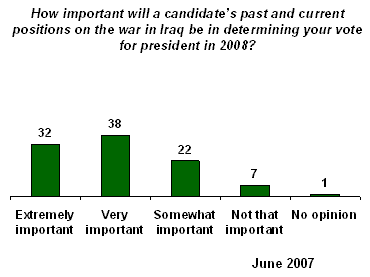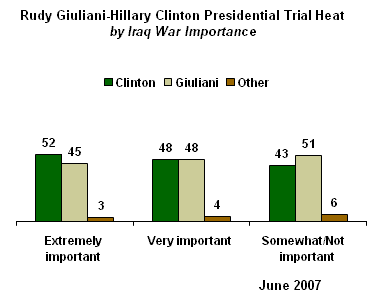GALLUP NEWS SERVICE
PRINCETON, NJ -- A good deal of the discussion during the 2008 presidential campaign to date has centered on U.S. policy toward the Iraq war. According to recent Gallup polls, about one in three Americans rate the war as an extremely important issue to their vote. Among this group, New York Senator Hillary Clinton fares better in a trial heat match up with former New York City mayor Rudy Giuliani than she does among those for whom the war will be a less important issue. Analysis shows that candidates' Iraq war positions seem to have less of an impact on current presidential nomination preferences, though Giuliani and Illinois Senator Barack Obama seem to be running slightly better in their respective primaries among those who view the war as a less critical issue.
Iraq War Importance
In two polls conducted this month, Gallup assessed the importance of the Iraq war to Americans' votes. Specifically, Gallup asked Americans "how important will a candidate's past and current positions on the war in Iraq be in determining your vote for president in 2008?" The combined results of these polls, consisting of roughly 2,000 interviews, are shown below.

Even though Gallup polling has consistently shown that Democrats are much more likely than Republicans to mention the Iraq war as the most important problem facing the nation and the top priority for the government to deal with, the two groups show only a slight difference in the importance they place on prospective presidential candidates' war positions. Thirty-five percent of Democrats and Democratic-leaning independents say these positions will be extremely important to their 2008 vote, compared with 31% of Republicans and Republican-leaning independents. Democrats who say that the war is extremely important are strongly anti-war, while Republicans who say the war is this important are strongly pro-war.
The War and Nomination Preferences
The Democratic presidential candidates have tried to balance the need to appeal to strong anti-war Democrats whose support will be crucial to winning the party's nomination with not taking positions that are so anti-war that they may turn off voters in the general election.
Clinton is the clear frontrunner for the party's nomination, and she is the leader among both Democrats who rate the Iraq war as extremely important to their vote and those who assign less importance to the war.* Her support is similar among both groups, and that is the case for nearly all Democrats. One possible exception is Obama, who does slightly better among those who say the war is less important to their vote than those who say it is extremely important. Though that result is not statistically significant, the net outcome is that Clinton has a much greater lead among Democrats who say the war is extremely important than among those who do not.
|
Democratic Nomination Preference
|
|||
|
All Democrats |
Democrats who say candidate positions on war extremely important |
Democrats who say candidate positions on war not extremely important |
|
|
% |
% |
% |
|
|
Hillary Clinton |
38 |
41 |
37 |
|
Barack Obama |
31 |
27 |
33 |
|
John Edwards |
13 |
16 |
12 |
|
Bill Richardson |
4 |
4 |
5 |
|
Joe Biden |
3 |
3 |
3 |
|
Mike Gravel |
1 |
1 |
1 |
|
Dennis Kucinich |
1 |
1 |
1 |
|
Christopher Dodd |
* |
* |
* |
|
Other/No opinion |
8 |
6 |
9 |
|
* Less than 0.5% |
|||
Republicans face a different challenge than Democrats on the war, as they must try to appeal to a mostly pro-war Republican base while distancing themselves from the Bush administration's policies that are widely viewed as ineffective. Giuliani, like Clinton among Democrats, is the frontrunner among all Republicans, regardless of their views on the importance of the war. Most Republican candidates -- including vocal war supporter Arizona Senator John McCain -- get similar support among those who say the war is extremely important and those who do not. The one possible departure from that general pattern concerns former Tennessee Senator Fred Thompson, who fares slightly better among those who assign the highest priority to the Iraq war.
|
Republican Nomination Preference
|
|||
|
All Republicans |
Republicans who say candidate positions on war extremely important |
Republicans who say candidate positions on war not extremely important |
|
|
% |
% |
% |
|
|
Rudy Giuliani |
32 |
29 |
34 |
|
John McCain |
20 |
20 |
20 |
|
Fred Thompson |
16 |
21 |
14 |
|
Mitt Romney |
11 |
9 |
12 |
|
Mike Huckabee |
3 |
4 |
2 |
|
Sam Brownback |
2 |
1 |
2 |
|
Tommy Thompson |
2 |
1 |
2 |
|
Ron Paul |
2 |
1 |
2 |
|
Tom Tancredo |
1 |
2 |
1 |
|
Duncan Hunter |
1 |
2 |
1 |
|
Jim Gilmore |
1 |
1 |
1 |
|
Other/No opinion |
10 |
10 |
11 |
The data for nomination preferences in both parties suggest that the Iraq war may not be the defining issue in the primaries, despite the attention it is being given. That might make sense from the standpoint that the candidates in each party have the same general orientation to the war. All the Democratic candidates are generally anti-war and their differences largely lie in the details of how best to remove U.S. troops from Iraq as soon as possible, while the Republicans are generally in favor of the war effort (long shot Texas Congressman Ron Paul being a notable exception) and they for the most part agree that Iraq should be stabilized before the United States pulls its troops out of the country. It is possible that disagreement over the details on Iraq policy may become more of a factor in voters' candidate preferences as the campaign wages on and voters become more familiar with the different candidates and their positions on issues, but at this point the Iraq war is not a major determinant of nominee support.
The War and the General Election
The analysis suggests that Americans' perceived importance of the war would be more consequential in the general election phase of the 2008 campaign. In the two polls that asked about the importance of candidates' positions on the Iraq war, Gallup also asked Americans for their preference in a trial heat matchup of the two frontrunning candidates in each party, Giuliani and Clinton.
There is a clear -- though modest -- linear relationship between Iraq war importance and candidate preference. Clinton leads Giuliani 52% to 45% among those who say the war is extremely important, while the two candidates tie among those who say it is very important. Giuliani has a 51%-to-43% advantage among Americans who say the war is only somewhat important or not important.

As mentioned above, the differences are not merely a function of the fact that Democrats attach more importance to the war as a political issue than Republicans. While this can explain some of the differences observed in the Giuliani-Clinton trial heat, these differences also emerge because Democrats who say the war is extremely important show a stronger preference for Clinton over Giuliani than Democrats who say the war is less important. Meanwhile, Republicans' support for Giuliani over Clinton is consistent regardless of how important they say the war is.
At this early stage of the campaign, it seems that Clinton has emerged as the favorite candidate of those who care most about the Iraq war, within the Democratic Party and in the American electorate more generally.
* The analysis of nomination preference by war importance groups respondents into only two categories -- those who rate the war as extremely important and all others. This is necessary given that the nomination preference questions are only asked of a subset of the entire sample.
Survey Methods
These results are based on telephone interviews with a randomly selected national sample of 2,004 adults, aged 18 and older, conducted June 1-3 and June 11-14, 2007. For results based on this sample, one can say with 95% confidence that the maximum margin of error attributable to sampling and other random effects is ±2 percentage points.
For results based on the sample of 672 Americans who say the Iraq war will be extremely important to their vote, the maximum margin of sampling error is ±4 percentage points.
For results based on the sample of 1,332 Americans who do not say the Iraq war will be extremely important to their vote, the maximum margin of sampling error is ±3 percentage points.
For results based on the sample of 262 Republicans and Republican leaners who say the Iraq war will be extremely important to their vote, the maximum margin of sampling error is ±7 percentage points.
For results based on the sample of 570 Republicans and Republican leaners who do not say the Iraq war will be extremely important to their vote, the maximum margin of sampling error is ±5 percentage points.
For results based on the sample of 360 Democrats and Democratic leaners who say the Iraq war will be extremely important to their vote, the maximum margin of sampling error is ±6 percentage points.
For results based on the sample of 626 Democrats and Democratic leaners who do not say the Iraq war will be extremely important to their vote, the maximum margin of sampling error is ±4 percentage points.
In addition to sampling error, question wording and practical difficulties in conducting surveys can introduce error or bias into the findings of public opinion polls.Thinking now just about Iraq,
36. How important will a candidate's past and current positions on the war in Iraq be in determining your vote for president in 2008 -- extremely important, very important, somewhat important, or not that important?
|
Extremely important |
Very important |
Somewhat important |
Not that important |
No
|
|
|
Registered Voters |
% |
% |
% |
% |
% |
|
2007 Jun 11-14 |
33 |
34 |
25 |
8 |
1 |
|
2007 Jun 1-3 |
32 |
43 |
18 |
6 |
1 |
|
|
|
|
|
|
|
|
National Adults |
|
|
|
|
|
|
2007 Jun 11-14 |
32 |
34 |
24 |
9 |
1 |
|
2007 Jun 1-3 |
33 |
41 |
19 |
6 |
1 |
